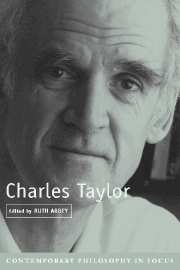Book contents
- Frontmatter
- Contents
- List of Contributors
- Acknowledgments
- Introduction: Timely Meditations in an Untimely Mode - The Thought of Charles Taylor
- 1 Taylor and the Hermeneutic Tradition
- 2 Taylor's (Anti-) Epistemology
- 3 The Self and the Good: Charles Taylor's Moral Ontology
- 4 Articulating the Horizons of Liberalism: Taylor's Political Philosophy
- 5 Toleration, Proselytizing, and the Politics of Recognition: The Self Contested
- 6 Taylor and Feminism: From Recognition of Identity to a Politics of the Good
- 7 Catholicism and Philosophy: A Nontheistic Appreciation
- 8 Taylor, “History”, and the History of Philosophy
- Bibliography
- Index
1 - Taylor and the Hermeneutic Tradition
Published online by Cambridge University Press: 05 June 2012
- Frontmatter
- Contents
- List of Contributors
- Acknowledgments
- Introduction: Timely Meditations in an Untimely Mode - The Thought of Charles Taylor
- 1 Taylor and the Hermeneutic Tradition
- 2 Taylor's (Anti-) Epistemology
- 3 The Self and the Good: Charles Taylor's Moral Ontology
- 4 Articulating the Horizons of Liberalism: Taylor's Political Philosophy
- 5 Toleration, Proselytizing, and the Politics of Recognition: The Self Contested
- 6 Taylor and Feminism: From Recognition of Identity to a Politics of the Good
- 7 Catholicism and Philosophy: A Nontheistic Appreciation
- 8 Taylor, “History”, and the History of Philosophy
- Bibliography
- Index
Summary
There are various ways of defining hermeneutics. The word derives from the Greek hermeneuein – to interpret – and according to the standard definition, hermeneutics is the theory or art of interpreting texts. Hermeneutics, so understood, evolved as a distinct field of enquiry in response to specific interpretative disputes. The question of how to interpret the Bible correctly gave rise to a tradition of biblical hermeneutics; traditions of legal hermeneutics arose to provide guidance in the interpretation of written law; and literary hermeneutics is concerned with the interpretation of works of “literature” in general, however that is defined. It would not be too far off the mark to say that within these contexts – in theological, legal, and literary studies – the term hermeneutics is associated with the theory and practice of sound exegesis.
The term has a quite different signification in contemporary Anglo-Saxon philosophy. Sometimes it is used to signify a cluster of epistemological problems relating to the validity or objectivity of textual interpretation and translation. Hermeneutics, in this sense, is a region of philosophical inquiry, a more or less self-contained source of philosophical puzzlement. Confusingly, hermeneutics is also a label used to designate a particular stance on these issues, one that rejects the idea that interpretations admit of objectivity, or at least objectivity in its fully blown form, at all. The term hermeneutics is also commonly employed in discussions of methodology in the social sciences.
- Type
- Chapter
- Information
- Charles Taylor , pp. 29 - 51Publisher: Cambridge University PressPrint publication year: 2004
- 6
- Cited by



